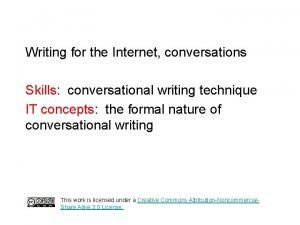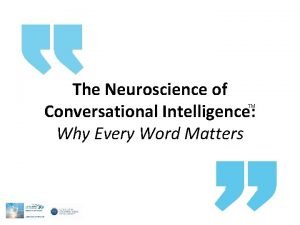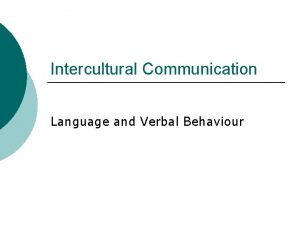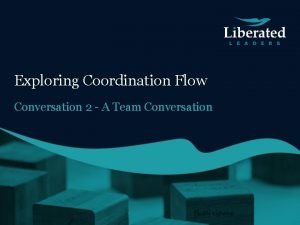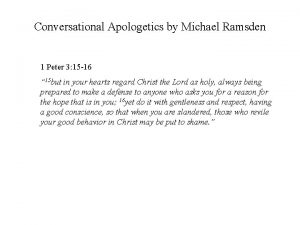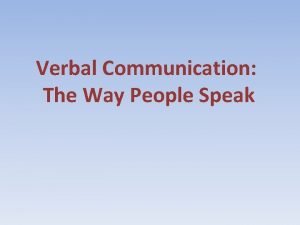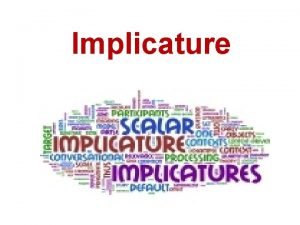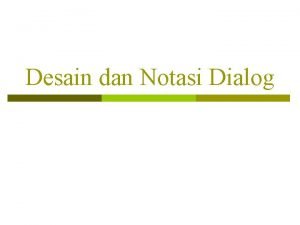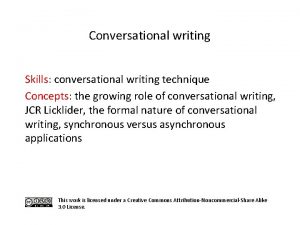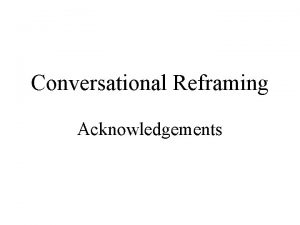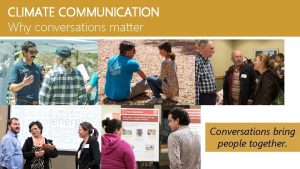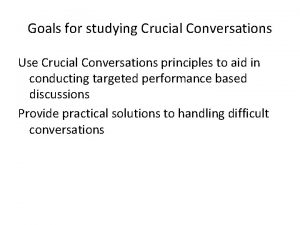Writing for the Internet conversations Skills conversational writing












- Slides: 12

Writing for the Internet, conversations Skills: conversational writing technique IT concepts: the formal nature of conversational writing This work is licensed under a Creative Commons Attribution-Noncommercial. Share Alike 3. 0 License.

Where does this topic fit? • Internet concepts – Applications – Technology – Implications • Internet skills – Application development – Content creation (text)

Types of writing for the Internet • Writing short documents • Conversational writing • Collaborative writing

Conversation examples • An email conversation with an individual • An email conversation with a group of people on a list server • A conversation with a group of people on a threaded discussion forum • A comment on a blog post

Conversational writing is important Jason Fried, co-founder of 37 Signals, a leading Internet software company, looks for writing skills when hiring people: Probably the most important thing and probably one of the surprises is you have to work with people who are good writers, Jason Fried, 2005. Fried is referring to precise conversations in which well defined orders and requests lead to commitments to complete tasks by accepted deadlines.

J. C. R. Licklider and Taylor, The Computer as a Communication Device, 1968.

An effective email conversation Would you like to have lunch today? > Would you like to have lunch today? Yes, what time and where? > Yes, what time and where? How about noon at Felippe’s? Noon is great --- where is Felippe’s? > Noon is great --- where is Felippe’s? Near Union station --- here is a link: http: // … Great -- I will meet you there at noon. OK

Effective because • The conversation was focused and stayed on the topic. • The conversation came to a shared agreement. • Both parties felt the conversation was ended, and there were no loose ends. • They quoted each other in replies to stay focused and to let the other person know they were being responsive.

Formal analysis of conversations • Conversations for action: a request or offer which is subsequently confirmed or dropped • Conversations for clarification: obtaining more information about something said earlier or in a prior conversation • Conversations for possibilities: creating ideas and selecting one or more for future discussion • Conversations for orientation: exchanging information about themselves or a situation Terry Winograd and Fernando Flores developed this taxonomy in the 1980 s when the Internet and email were beginning to catch on.

An effective email conversation Would you like to have lunch today? (commitment request) > Would you like to have lunch today? Yes, what time and where? (confirmation and clarification request) > Yes, what time and where? How about noon at Felippe’s? (offer a possibility or confirmation) Noon is great --- where is Felippe’s? (confirmation and clarification request) > Noon is great --- where is Felippe’s? Near Union station --- here is a link: http: // … (clarification) Great -- I will meet you there at noon. (confirmation) OK (confirmation)

Conversational writing tips • Think about the purpose of the conversation. • Quote previous statements when appropriate. • Reply to all questions or requests for information – no loose ends. • Respond (positively or negatively) to all requests for a commitment, and honor commitments or deadlines you agree to. • If time allows, set your reply aside before re-reading and sending it. • Read carefully before replying.

Writing for the Internet, conversations Skills: conversational writing technique IT concepts: the formal nature of conversational writing This work is licensed under a Creative Commons Attribution-Noncommercial. Share Alike 3. 0 License.
 What is conversational writing
What is conversational writing Conversational intelligence dashboard
Conversational intelligence dashboard Conversational constraints theory
Conversational constraints theory Conversational coordination example
Conversational coordination example Towards deep conversational recommendations
Towards deep conversational recommendations Conversational evangelism
Conversational evangelism Conversational apologetics michael ramsden
Conversational apologetics michael ramsden Verbal communication the way people speak
Verbal communication the way people speak Negative tone
Negative tone Laurillard conversational framework
Laurillard conversational framework The cooperative principle examples
The cooperative principle examples Recasting example
Recasting example Conversation designer
Conversation designer
